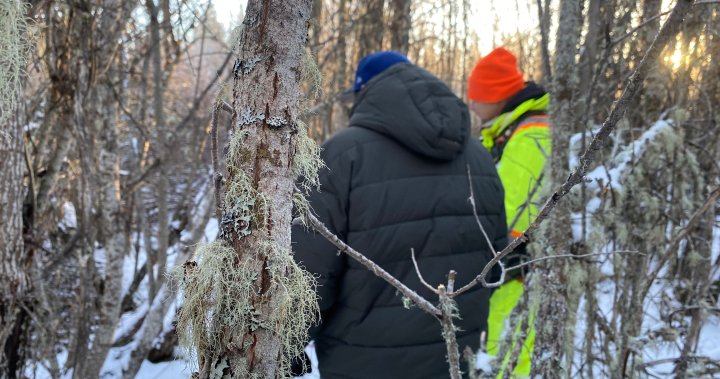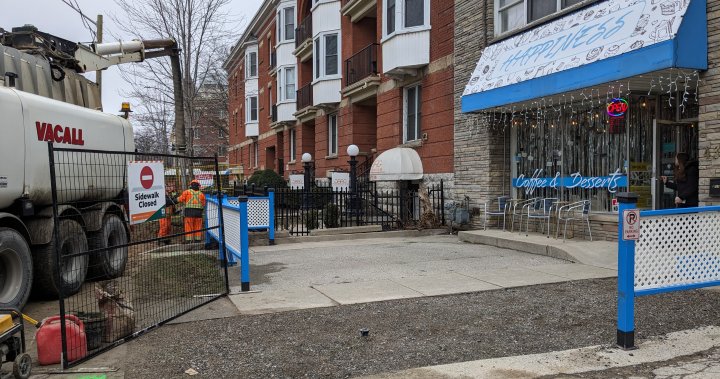It’s not uncommon for Mukwa Bear to get a ping on his phone, pack up his gear and hit the road with the goal of bringing someone back to their family.
An expert First Nations hunter and tracker with a wealth of experience in search and rescue, Bear has spent the past four years with his phone set to alert him when an Indigenous person goes missing.
He grew up on the trapline immersed in his culture and traditions before being taken into foster care. Many of his early skills were passed on from family with deep roots in Wabaseemoong, an Ojibwe community in Northwestern Ontario also known as Whitedog.
In Canada, research shows that Indigenous women are 400 per cent more likely than non-Indigenous women to go missing. And when they do go missing, the search is often hampered by police apathy.
“The knowledge that (Bear) brings to community is invaluable, he offers a skill set that you can’t really find anywhere,” said Cora McIntosh, general manager for Saik’uz First Nation, where Bear has spent the past month. “The willingness, compassion, kindness and caring he shows to the families is great because he’s doing it from his heart.”
His work is what led police to find missing Saik’uz member Chelsey Heron less than 1 km from where she went missing.
Bear conducts searches on his own dime — asking only for room and board — and doesn’t stop searching until he finds the family’s missing loved one or the family asks him to move on.
So far, he has helped out on over 15 searches in Manitoba, Saskatchewan, Alberta and British Columbia. Ten of which have ended in a body being found.
“I dedicated my life to searching, to finding those that are lost,” said Bear. “It’s what I’m good at so I just do it out of love for First Nations and because that’s how I’d been brought up. I just go from search to search, and when I’m done I get a couple days rest and then I go to the next.”
Mukwa Bear is the name Bear prefers to use. Global News is also using it to protect his personal safety as he often searches for victims of crime and have been targeted by people who don’t want them to be found.
Bear first sent a message to Pam Heron, Chelsey’s mom, on Nov. 1, 2023 asking if she needed help searching for Chelsey. At the time, Chelsey had been gone for over three weeks and her family was frustrated with what they perceived as police disinterest.
He took a bus and arrived in Saik’uz, 100 km West of Prince George, on Nov. 2, 2023. The following day, Saik’uz First Nation held a press conference asking for support in the search and Bear set out.
“A little girl came over with Pam, Chelsey’s little sister, and handed me a picture, and Pam handed me some tobacco,” said Bear. “With the tobacco from the prayers and all the love her sister put into that picture, I was able to connect with my intuition and I found Chelsey’s ID out in an area where dirt was up to my knees, that’s where a lot of searchers won’t go, where its so dirty.”
On Nov. 5, Bear found evidence of Chelsey’s disappearance and sent photos to Pam.
“I sent her pictures of a bank card I found on the ground, I put my gloves on and I picked it up and Chelsey’s name was on there and I took a picture of it, took a picture of the IDs on the ground, her shoes a little bit away,” said Bear.
Eventually police and a search dog arrived and soon after, police found Chelsey’s body. “We just set up a fire there and I stayed there all night … I just waited for confirmation,” said Bear.
Chelsey’s family, and many others, are grateful for his work.
“It’s a blessing, this guy,” said Warren Holmes, Chelsey’s father. “We were at a wall with this search and then he just heard our story and showed up and two days later, unbelievable.”
Most of the families Bear searches for don’t know him when he reaches out via Facebook messenger asking to help.
“It’s just always gratifying to bring people home alive, to bring people home even when they passed on to the spirit world,” said Bear. “That sense of loss is at least put to rest and there’s closure.”
“It still doesn’t even feel real, even though we’ve done all of the burial. It still feels just not real anymore,” said Tamara DeLong, Chelsey’s aunt.
The family, while appreciative of Bear and what he did for them, feel the police didn’t do enough. A probe has been called into the RCMP’s handling of the matter with the Independent Investigations Office of B.C. now investigating Chelsey’s death.
“I wish they would have treated it more as an investigation, rather than just a missing person,” said DeLong. “I don’t feel like (police) did enough, it took an outsider to come from far away to find her, and she was less than a kilometer away from where she went missing.”
“That just says that they don’t care about missing people on reserve,” adds Holmes. “I think they just always want to close the case, they didn’t show no compassion for her like that, they could have deployed the dogs, they could have they could have done a lot more.”
The RCMP told Global News that because of “the length of time Chelsey had been missing, no known direction of travel, and the amount of community and volunteer (search and rescue) in the area, the police service dog was not a viable option,” but that they did “attend at various other stages throughout the investigation.”
While the investigation is underway, Heron’s family says Bear gave them a gift they didn’t expect and it’s helping them find closure as they grieve and wait for answers.
“Chelsey was my daughter, my heart. She was outgoing person, just happy and she loved her siblings, she loved her family,” said Holmes. “We’re going to plan to build a nice memorial for her, clear this out, raise a walkway, flowers and everything.”
Before coming to Saik’uz, Bear spent eight months in Williams Lake looking for Carl Schooner Jr. who was last seen on Dec. 4, 2022 . His family drove up to Saik’uz to meet with Chelsey’s father this past week.
“We made this journey to honour him for who he was, he was always by my side,” said Schooner. “He’d want me to find him, take him home.”
Schooner said they made the trip to Saik’uz to learn from the other families, like Chelsey’s. He believes its important to build connections so Indigenous families with missing loved ones can help each other.
Despite the long search that has not yet yielded results, Schooner’s family hasn’t given up hope.
“It’s one of the hardest things to go through, not knowing where your child is, not knowing what happened to them,” said Schooner. “The rest of the world seems like it just moves on but we’re stuck in December 2022.”
The last time Schooner spoke to his son, Carl Jr. was over the phone.
“He said ‘Could you come pick me up’. He wanted to surprise everybody at home,” said Schooner. “He goes, ‘Don’t tell anybody I’m coming home’ … and that never happened, by the time I went to get him he was missing.”
The Schooners are frustrated with the lack of progress on their son’s case and said every conversation they’ve had with police is the same and they’re given no updates.
Bear spent eight months helping the Schooners and giving them hope.
“When I first met him, he goes, ‘I’m here to help you look for your lost child,’” said Schooner. “We need more men like him to train or even to have a first response for missing Indigenous people right away.”
Schooner said they talked about Bear maybe one day walking to Ottawa to seek funding from Canada for his work.
Despite not being able to find Carl Jr., the Schooners are grateful for Bear’s efforts.
“He put his heart out, he wants to help families get through what they’re going through,” said Schooner. “He’s been with us and he’s gotten us through some really rough times. And through his spiritual ways, he’s just a one of a kind of personality.”
Before Bear starts any search he sings the beginning of the eagle song and doesn’t sing the rest until his work is done.
“I do my prayers, I smudge and offer tobacco, I empty my mind and heart and go with my intuition its not easy to get in touch with your intuition it’s like a needle in a haystack,” said Bear. “I’m here to look for our people, to put an end to this nightmare.”
The only tools he brings with him on searches are a knife and bear spray.
“I put everywhere I search on Google Maps with longitude and latitude and when I find something I’ll take a picture and give everything I find to the mother or father, the people I search for,” he said. “And they’ll give info to their chief and then the cops but its always the family first.”
But his searches aren’t always straight-forward. Bear said he’s been followed by gangs on several occasions.
“There’s a lot that’s being left behind and being out on Mother earth should be like home,” said Bear. “But people go get lost and people go get hidden.
“I just work with the tracks of the animals that tell the stories when having to search for somebody — it’s not just track the person you’re looking for. You’re also tracking where everyone moves.”
After Bear found Chelsey, he immediately began searching for another missing Saik’uz member, Jay Raphael.
“The last time we (saw) him was on Feb. 25, I dropped him off at his cousin’s place,” said Curtis Raphael, Jay’s father. “I told him if you need a ride home, whenever you’re done, call me and I’ll come pick you up. But he said, ‘Don’t worry about me, I’ll be home.’”
But he didn’t come home.
That weekend, the community was hit with a dump of snow and Raphael said by the time they reported Jay missing, it was too late to look for tracks or prints.
“It was hard for me and the wife. We have to live with it every day, we don’t have closure but we need closure.“
Now with Bear’s help, the family is hoping something will be uncovered.
“He’s been searching everywhere, (sometimes search and rescue) don’t go far enough,” said Raphael. “People that give him tips and where they think Jay is, he’s been going in there and checking out all these areas.”
Saik’uz has been supporting Bear’s work in hopes the Raphaels get resolution.
“It’s hard because we don’t know if he’s dead or alive,” Raphael said. “Jay had two little boys and they’re asking where their dad is. Somebody out there knows what happened to my son and I wish that person would come forward.”
Bear’s work is crucial for keeping Jay’s search alive and case from going cold.
“I’ll stay here until I find Jay, and then I’ll move on to another search,” said Bear.
Bear wants to continue this work as long as he’s able.
“If there’s anything I want out of this, it’s more support. More hunters, First Nations people, chiefs to really have to come together and help,” said Bear. “Its just sad how many people are going through these nightmares, its just non-stop that people keep going missing.”
He said he could provide search and rescue recovery training to anyone wanting to help him search and hopes a formalized program could be developed in communities.
He’s currently trying to fundraise for an ATV that would help his searches and in the meantime, Saik’uz has lent him theirs.
The growing list of families he has helped so far, fully believe in his mission.
“I think what he does is amazing, we wouldn’t have had the closure if it wasn’t for him,” said DeLong. “I feel like there needs to be more people like him because he does it with no judgment, he doesn’t ask for the situation around why this person is missing — he just goes out and he searches to help families. There needs to be some kind of funding put up for him.”
For now, it’s a labour of love, rooted in Bear’s Indigenous knowledge and spirituality. He hopes it inspires others to join in taking ownership for bringing missing loved ones home.
“That would be one of the best things that could happen, because right now there is nothing like that,” said Schooner. “We need more people like that and we need quads, trucks, drones and dogs.“
Bear says the spiritual awakening that led him to this work will stay with him for the rest of his life.
“I might just go missing myself,” he explains,” But that’s the risk take and I don’t care, I’m searching for our people and I’m going to keep doing it.”




